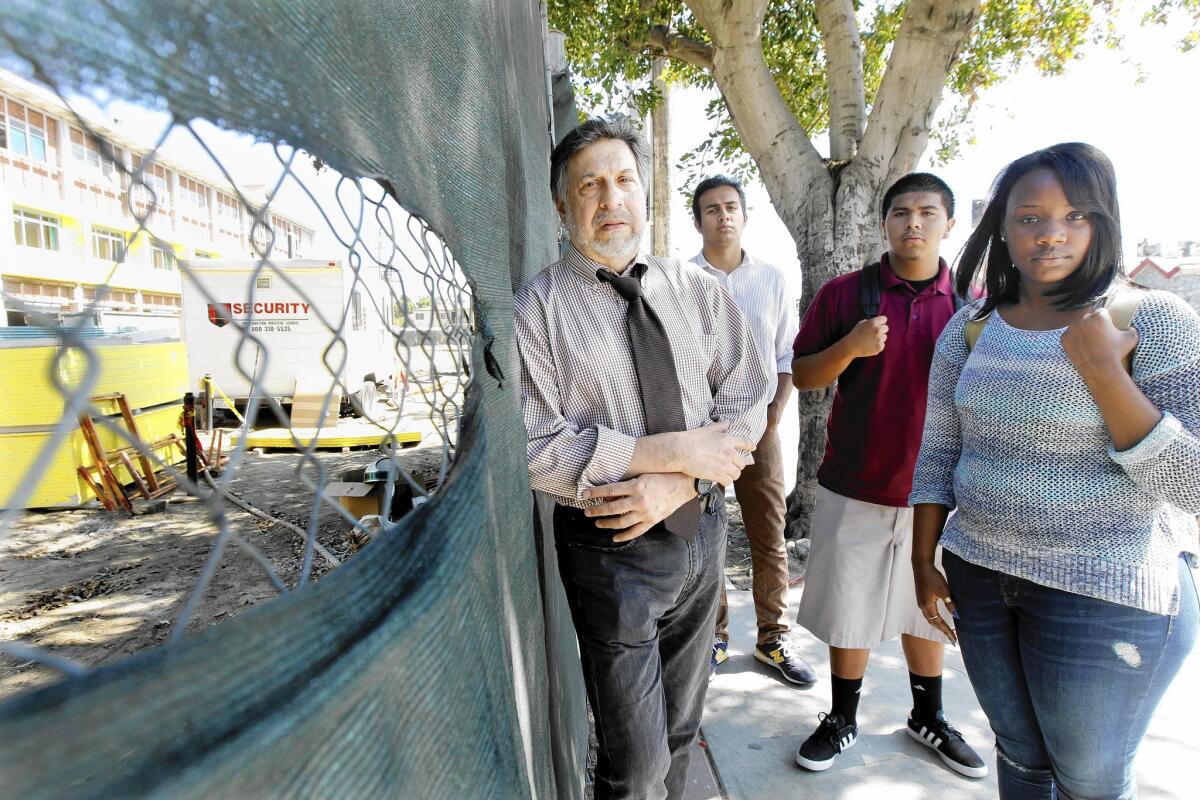Suit alleges state isn’t providing adequate education to some students

Thousands of students in California miss out on days, weeks and even months of classroom instruction because of chaotic campuses, high teacher turnover and a severe lack of resources, according to a lawsuit filed Thursday.
The suit, brought in Alameda County Superior Court by the American Civil Liberties Union, Public Counsel and others, contends that the state has ignored its obligation to provide an adequate education for these students, most of whom are minorities and from low-income families.
Attorneys accuse California of violating the state Constitution’s equal protection guarantee by failing to ensure that all students receive a minimum level of instruction.
Among the reasons, attorneys say: unstable and transient staffing of teachers, counselors and administrators; a lack of course offerings that can lead students to be assigned to free periods or administrative tasks rather than academic classes; the frequent interruption of class by violence or security issues; chronic student absenteeism; and a lack of mental health professionals.
Supt. of Public Instruction Tom Torlakson and state Board of Education president Michael Kirst said in a joint statement that the best way to improve student achievement is through the state’s new school finance system, which will add millions more to districts for students who are low-income, learning English and in foster care.
The new system “empowers them to determine how best to meet the needs of the students they serve,” the statement said, adding that they will resist efforts to derail the new funding due to “costly and unnecessary litigation.”
Cruz vs. California, filed on behalf of students from seven schools including those in the Los Angeles and Compton school systems, calls on the state to establish a system of tracking the days and minutes of instruction that accounts for time lost, rather than relying solely on the academic calendar, and for the state to intervene when a school falls short.
“Something as basic as learning time — real learning time — is disproportionately distributed to kids as a function of their ZIP Code,” said Mark Rosenbaum, chief counsel of the ACLU of Southern California. “The kids who go to these seven schools have a set of challenges that kids in schools elsewhere could never dream of, let alone confront.”
The schools named in the class-action lawsuit are Fremont High School and Florence Griffith Joyner Elementary School in L.A. Unified; Castlemont High School and Fremont High School in the Oakland Unified School District; Nystrom Elementary in the West Contra Costa Unified School District; and Compton High and Franklin S. Whaley Middle School in the Compton Unified School District.
A Compton Unified School District official said the district has yet to review the litigation.
Students at Fremont High School in South L.A. faced nearly all of the challenges outlined in the litigation, lawyers said.
The school, which is almost entirely composed of black and Latino students, had a revolving door of administrators in recent years, teachers are frequently absent and substitutes can lead classrooms for months. Students can be subjected to violence inside and outside of school and lack the services to help them cope with such trauma, the lawsuit alleges.
L.A. Unified has attempted to deal with its lowest-performing campuses. In 2010, then-Supt. Ramon C. Cortines required all Fremont staff to reapply for their jobs. Fewer than half of the teachers returned.
Jessy Cruz, 18, a Fremont senior, said he isn’t on track to graduate, due to a lack of counseling and class offerings.
Because of frequent changes in his foster care placement, Cruz transferred from Fremont for a few months during his sophomore year but returned the same year. A lawyer had to intervene so Cruz could receive credit for the work completed at the other school. He said he also had little help in figuring out classes for graduation.
Cruz now lacks the credits to receive a diploma. Still, he was placed in three classes that have no instruction this semester.
“We don’t have a college center anymore. I took classes I didn’t need,” said Cruz, who will attend summer school. “I was missing credits. I should have been taking classes that I needed. That’s time being wasted.”
Briana Lamb, 17, who is scheduled to graduate from Fremont in a few weeks, will attend Cal State Northridge in the fall. She worries that her school left her unprepared.
“I shouldn’t have to question when I graduate and go off to college: Am I prepared?” she said. “Nobody of any race, of any color, should have to go to a university and feel like you don’t belong there.”
The disparity in resources between her school and others is clear, she said.
“It’s unfair,” she said. “It’s not a secret. You can look at other communities and other schools and see the things that they offer.”
Students at these schools believe that the state has given up on them, Rosenbaum said.
“The kids get it. They know what the state of California is saying to them,” he said. “They’re telling them that they’re disposable, that they don’t value their education.”
More to Read
Start your day right
Sign up for Essential California for news, features and recommendations from the L.A. Times and beyond in your inbox six days a week.
You may occasionally receive promotional content from the Los Angeles Times.







